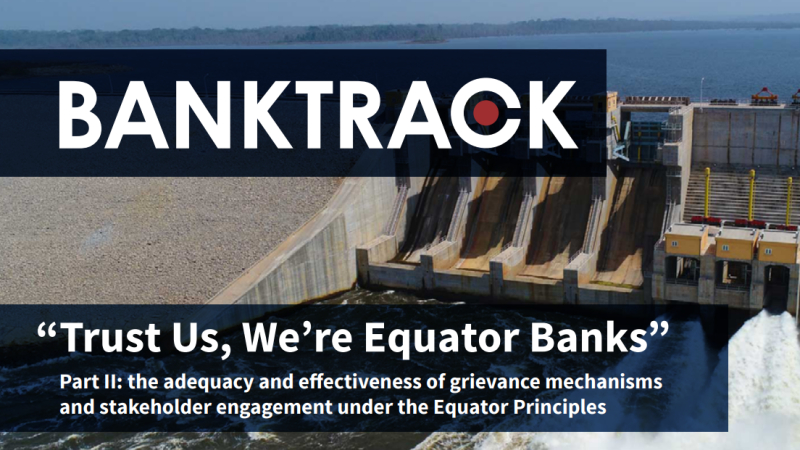Equator Banks fail communities on consultation and grievance mechanisms, new study finds

Communities affected by projects financed under the Equator Principles, banks’ own rules for financing large infrastructure projects, report that consultation is unsatisfactory and they are unable to seek redress through effective accountability mechanisms. This is despite the Principles requiring that effective stakeholder engagement and project-level grievance mechanisms are put in place. These issues are reflected in the findings of BankTrack’s new briefing paper, “Trust Us, We’re Equator Banks” Part II, published today. Although banks began implementing a new version of the Equator Principles, “EP4”, in October, the new Principles do not address these shortcomings.
The paper investigates nine projects financed under the Equator Principles since 2016, in high-risk sectors such as mining, hydropower, coal, oil and gas. It finds that the banks financing the projects failed to ensure adequate assessment documentation was provided to affected stakeholders for seven out of the nine projects analysed, although this is a requirement of the Principles. In addition, it found that although the Equator Principles require project-level grievance mechanisms to be put in place so that project-affected communities can raise complaints and seek resolution, in many cases these mechanisms are not actually being used. Reasons include distrust in project sponsors and a lack of awareness of the mechanism.
For example, local communities impacted by the Nachtigal Hydropower project in Cameroon have been unable to access full environmental and social impact studies, including resettlement and compensation actions plans. In addition, communities reported that consultation meetings were often threatening environments where individuals felt unable to raise their concerns. Although the company has implemented a project-level grievance mechanism, local communities did not know that it existed.
This briefing paper is the second instalment in an effort to systematically evaluate for the first time whether key aspects of the Equator Principles are being followed. It follows an earlier paper which analysed 37 projects and found no evidence of stakeholder engagement processes or project-level grievance mechanisms in 65% of cases. The results highlight a number of problems regarding compliance with the Principles on the ground.
Based on the findings of the two research papers, BankTrack has made six recommendations for how the Equator Principles Association (EPA) and Equator Principles Financial Institutions (EPFIs) can address the issues identified and improve overall compliance with the Principles on the ground, without resorting to a new update of the Principles:
-
Require consent from clients for project name disclosure as part of loan agreements
-
Publish a Compliance Report to show how projects are meeting EP requirements
-
Invest in ensuring clients do stakeholder engagement well
-
Ensure project-level grievance mechanisms are not just in place, but effective
-
Establish an initiative-level Accountability Mechanism for the Equator Principles
-
De-list EPFIs that persistently fail to comply with the EP
Hannah Greep, coordinator of BankTrack’s Equator Principles campaign and author of the briefing paper, commented: “Communities that are confronted by plans for large infrastructure projects that potentially negatively impact their lands, rights and livelihoods should be able to rely on the Equator Principles to ensure that they are being adequately consulted on how such projects are designed and how impacts will be mitigated. Similarly, when things go wrong, which they inevitably sometimes do, the Principles are meant to ensure that their grievances are properly addressed and resolved.
"Yet our research shows that the Equator Principles are, in most cases, not working for communities. More needs to be done by the Equator Principles Association and signatory banks to ensure the Principles are a framework that effectively manages social and environmental risk, and that works for financial institutions, affected communities and the planet alike.”
See the full briefing paper here.
Note for editors:
In the Equator Principles, Principle 5 requires all Category A and B projects (The highest risk categories) to have an ongoing process of effective stakeholder engagement with affected communities and other stakeholders. Under Principle 6, they require all Category A projects and “as appropriate” Category B projects, to establish a project-level grievance mechanism which is designed to receive and facilitate resolution of concerns and grievances about the project’s environmental and social performance.





